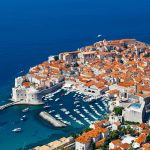ZAGREB, January 23, 2020 – European Commission Vice President Dubravka Šuica on Wednesday presented a document in Brussels according to which the Conference on the Future of Europe would be a new public forum for an open, inclusive, transparent and structured debate with citizens of diverse backgrounds and from all walks of life.
The Commission has adopted the Communication on its ideas on what the Conference on the Future of Europe should look like and proposes that it begins working on Europe Day, May 9, and to run for two years.
“The Commission proposes to launch the Conference on Europe Day – 9 May 2020. This year will mark the 70th anniversary of the signing of the Schuman Declaration and the 75th anniversary of the end of the Second World War. As the launch would coincide with Croatia’s rotating Presidency of the Council of the EU, the kick-off event could take place in Dubrovnik,” the EC says in its communication published on its website.
Defining the concept, structure, scope and timing of the Conference must be a truly joint effort by the European Parliament, the Council and the European Commission, the document says. EC Vice-president for democracy and demography, Croatia’s Dubravka Šuica, has been assigned with the task of organising the conference.
“We must seize the momentum of the high turnout at the last European elections and the call for action which that brings. The Conference on the Future of Europe is a unique opportunity to reflect with citizens, listen to them, engage, answer and explain. We will strengthen trust and confidence between the EU institutions and the people we serve. This is our chance to show people that their voice counts in Europe,” Šuica was quoted as saying.
The European Parliament has already defined its position in a resolution adopted on 15 January, and the document calls for “an open and transparent process which takes an inclusive, participatory and well-balanced approach towards citizens and stakeholders.”
The Council will discuss the topic on January 28. Croatia’s presidency is tasked with harmonising proposals and positions by member states in that regard.
After the Council adopts its relevant document, all three institutions — the Council, the EC and the EP — need to adopt a joint statement defining the concept, structure, scope and timing of the conference.
European Commission President Ursula von der Leyen has said that all Europeans will actively contribute to the Conference. “It is only together that we can build our Union of tomorrow,” von der Leyen said.
The Commission proposes two parallel work strands for the debates.
The first should focus on EU priorities and what the Union should seek to achieve: including on the fight against climate change and environmental challenges, an economy that works for people, social fairness and equality, Europe’s digital transformation, promoting our European values, strengthening the EU’s voice in the world, as well as shoring up the Union’s democratic foundations.
The second strand should focus on addressing topics specifically related to democratic processes and institutional matters: notably the lead candidate system and transnational lists for elections to the European Parliament, according to the information on the European Union’s website.
More news about Croatia and the EU can be found in the Politics section.








